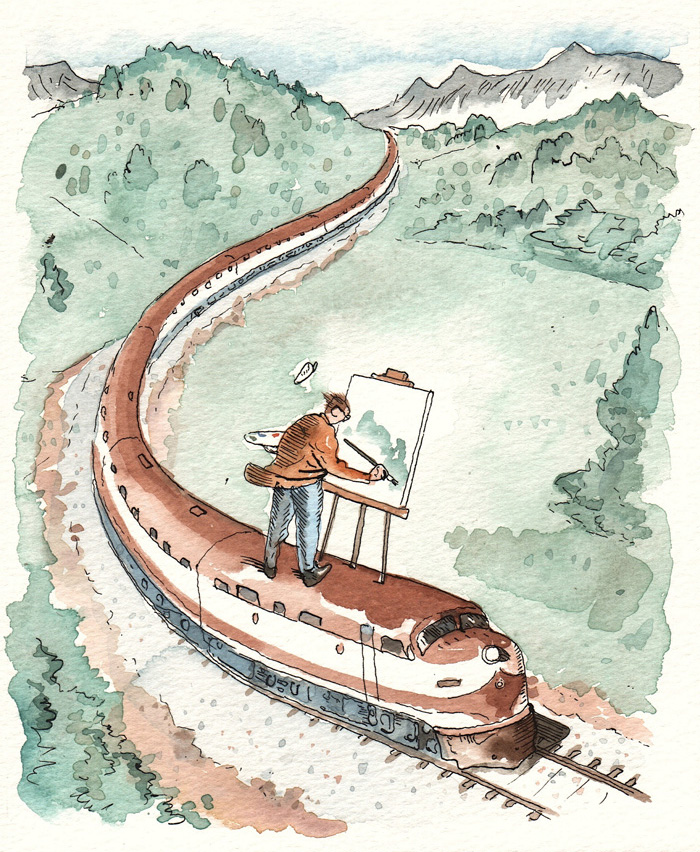Previous Article
Next Article
- AM WORLD
- FEATURES
- 100 YEARS OF ASTON MARTIN
- ARCHIVE
The Big Question
END OF THE LINE
IN THE 21ST CENTURY, IS IT BETTER TO TRAVEL OR TO ARRIVE?
Words Susan D’Arcy | Illustration Barry Blitt

Travel was a romantic notion in the time of Robert Louis Stevenson, leading him to declare: “I travel not to go anywhere, but to go. I travel for travel’s sake. The great affair is to move.” That was in Travels with a Donkey in the CÚvennes (1879), one of his earliest works, a pioneering piece of outdoor literature. In those days earnest scholars embarked on grand tours of the European Renaissance cities to educate themselves or headed to healthy enclaves to cure themselves of serious illness.
Today, those most likely to talk about going on a long journey are reality-TV contestants; and the emergence of Ryan-err and Sleazyjet has changed our attitude about getting from A to B indelibly, by proving that if you charge a penny per seat, the vast majority of passport-holders will happily fly to an airport in a cabbage field 50km outside a city they can’t pronounce, let alone know anything about.
It’s a long way from the early days of aviation when “air stewardesses” carved your roast beef in the aisle and ladies kept their hats on throughout the flight. But while airlines might now refer to passengers as self-loading freight and charge for everything—even emotional baggage—and airport security is barely below waterboarding in torture terms, other forms of transport retain some excitement and anticipation. Whose pulse doesn’t race when entering the neo-Gothic glamour of St Pancras station? I would always choose the train over the plane, the changing landscape is always a learning thrill and the Trans-Siberian Railway is the ultimate classroom.
Slow boats also remain a fast track to a country’s soul. Cruising the Nile, you will still see boys along the banks teasing the family camel as their fathers deftly spear fish for supper, much as they have for centuries. Choose carefully, though. The Mekong might be the world’s 10th-longest river but on the stretch from Laos to Thailand the water was brown, the banks were brown, the mountains were brown, so when my boat’s interior designer was considering a colour scheme, he opted for—take a wild guess—yes, brown.
Similarly, arrival needs to be approached with discrimination in the 21st century to avoid disappointment. As the world gets smaller, travellers must get smarter. These days, the sound of ringtones kills the mood at Angkor; you barely notice the beaches for the built-up resorts on Barbados; the crocodile you spot on safari is a convoy of 4WDs and exotic Marrakesh has become so homogeneously gentrified, it’s turning into a sweatier version of the King’s Road. But for every tourist trap, there is still a parallel universe nearby with the ability to enthral. Tap into your spirit of adventure and travel, and arrival can still be equally exhilarating. Of course, I could tell you about my secret shangri-las, but then I’d have to kill you. After all, I’ve always regretted letting Leonardo DiCaprio get his hands on that map of how to get to The Beach...
Susan D’Arcy writes about luxury hotels and spas for The Sunday Times
Previous Article
Next Article
- AM WORLD
- FEATURES
- 100 YEARS OF ASTON MARTIN
- ARCHIVE
